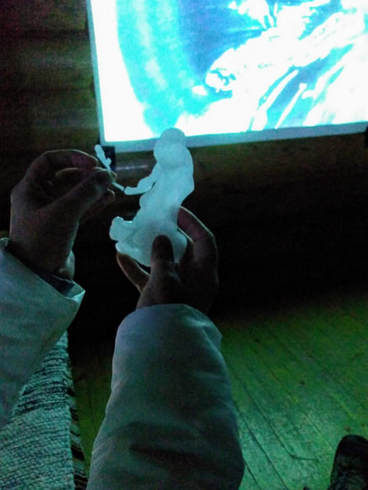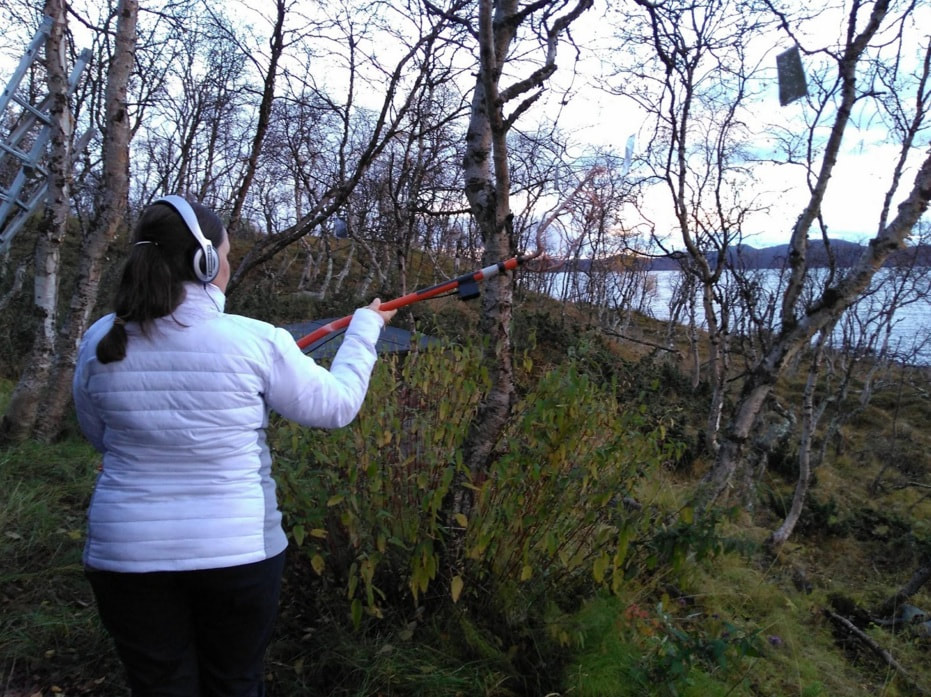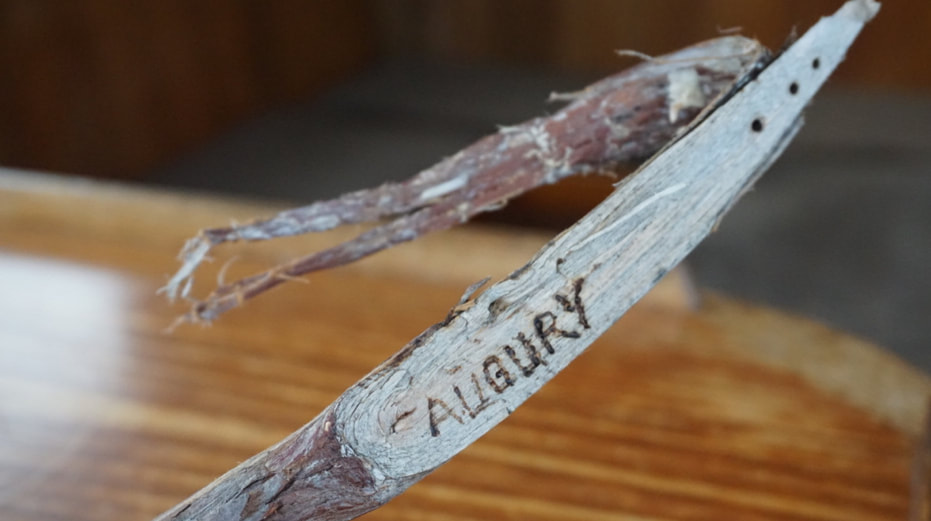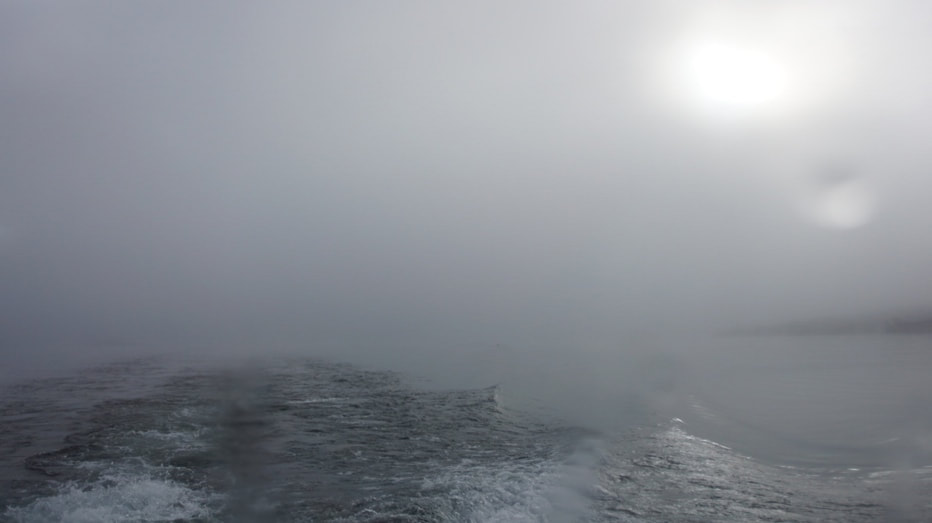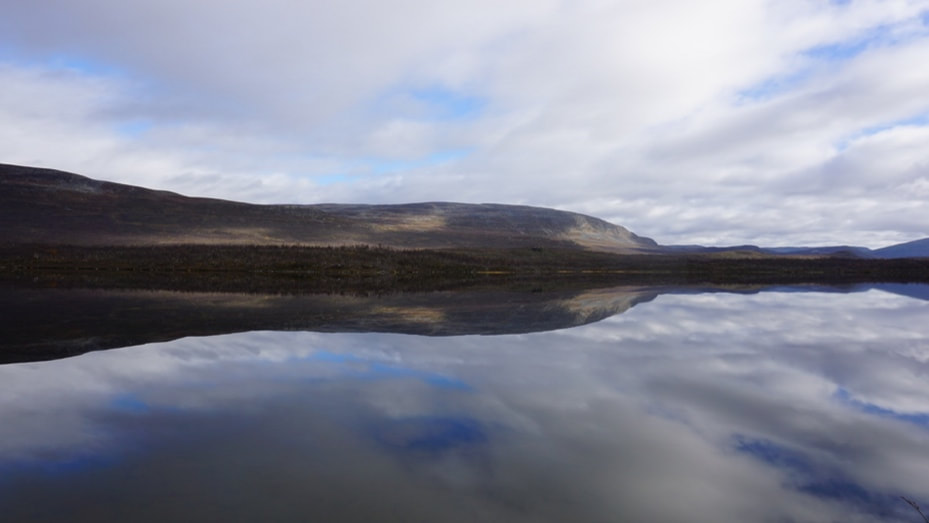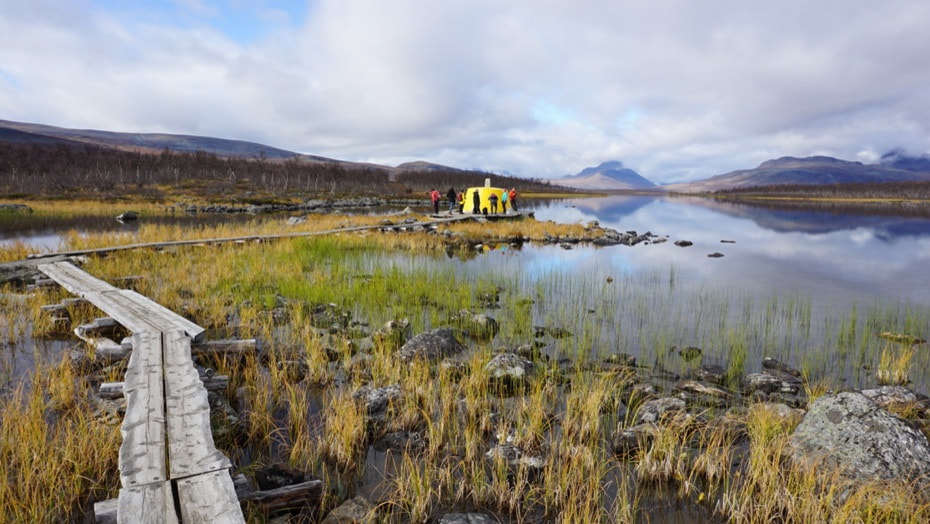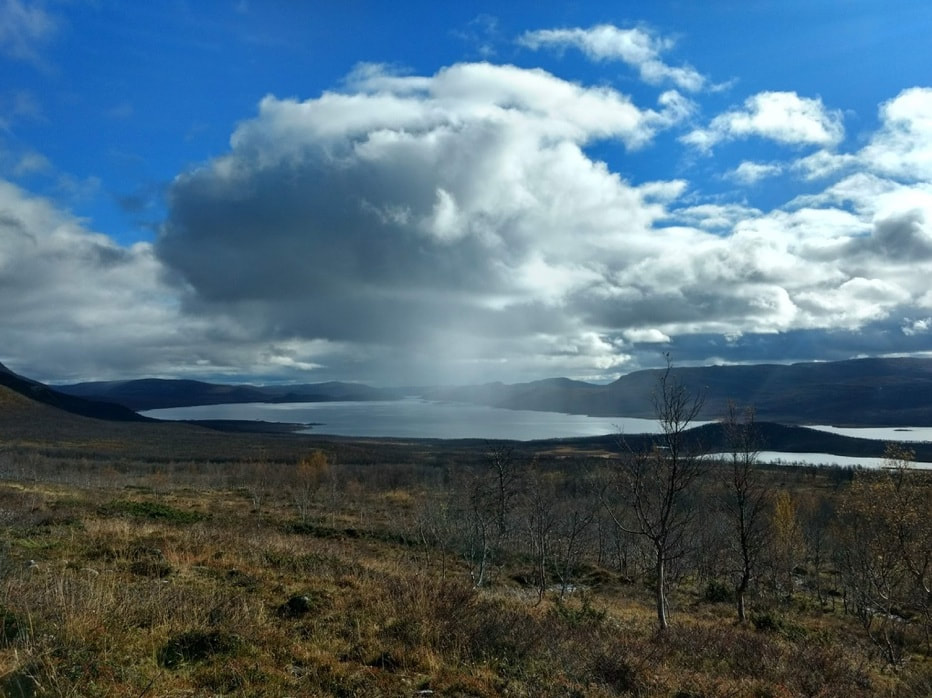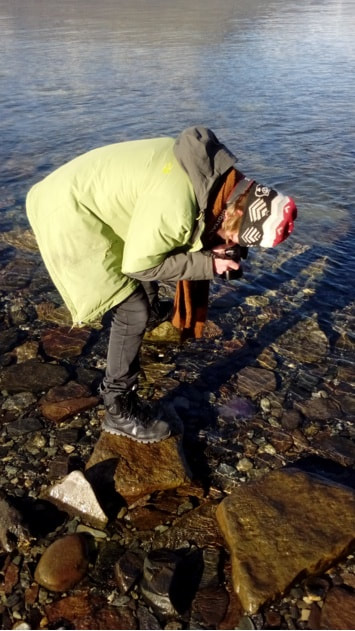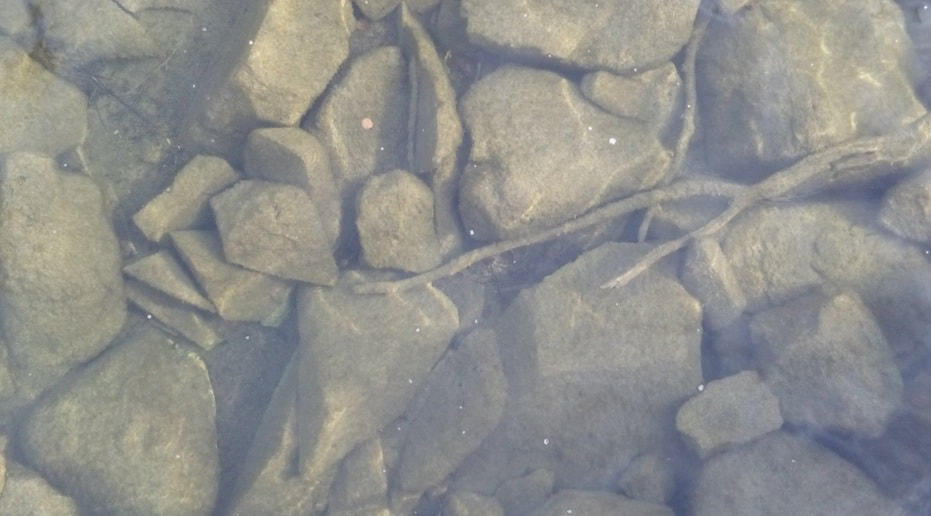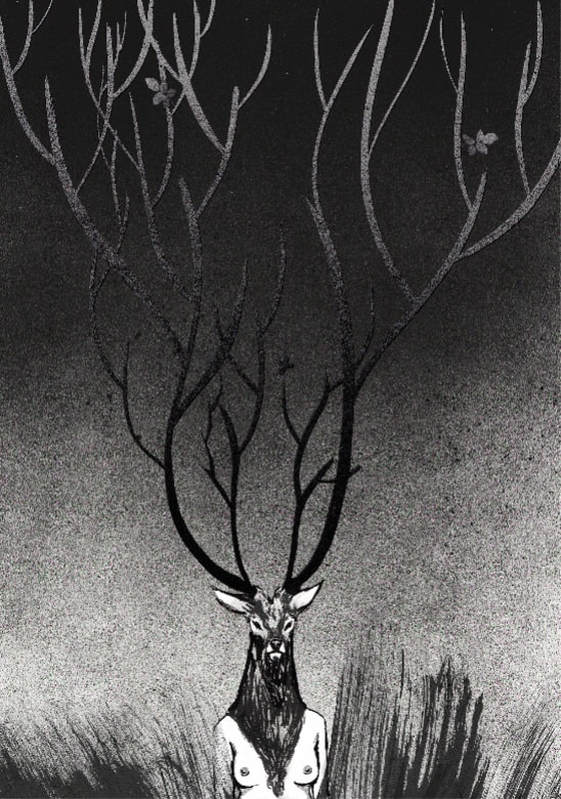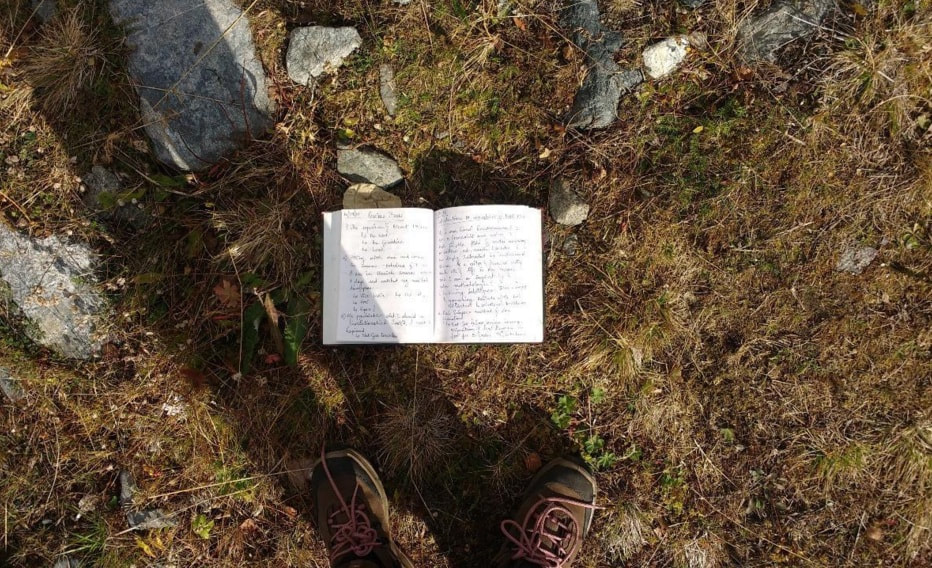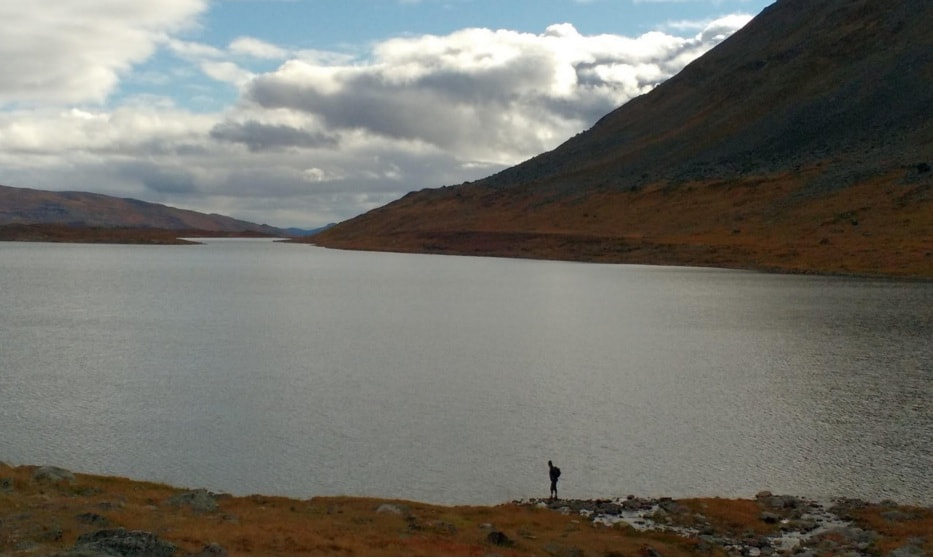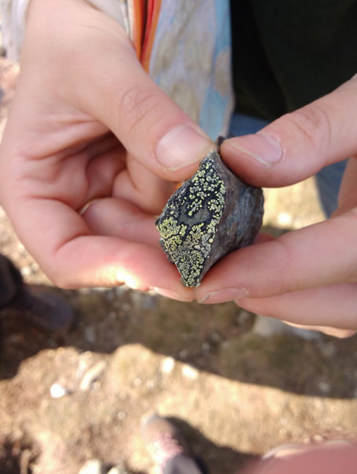|
These ekphrastic poems are selections from the “Second Order” group who observed the Bioart Society-sponsored “Field Notes: Ecology of Senses” in September 2018 in Lapland, above the Arctic Circle. These works are responses to the contemporary artworks and processes by international artists working at the Kilpisjärvi Biological Station in Finland. Each is paired with the relevant artwork. More at: https://bioartsociety.fi/projects/field-notes-1/pages/second-order-2 Futuring Wax In your outdoor moorish room, the fabric drapes head to clouds, the womb of the lingonberry’s bud is the flower of your belonging in the fantasy of a tent-living room, a yurt I once visited that smelled of goat’s idol form and a ting of scalp sweat, though I would have laid down under the pasture before I told them how different it smelled from the forest or even home, so when you offer mellow delights of new wax from water, from a blue oyster inlaid box I pinch just the corner, more to feel it, than to taste the salt. Hannah Star Rogers Hannah Star Rogers’ poems and reviews have appeared in The Kenyon Review, The Boston Review, The Los Angeles Review of Books, Tupelo Quarterly, The Carolina Quarterly, and TSR. She received her MFA at Columbia University, her PhD at Cornell University, and is currently a visiting scholar the the University of Edinburgh. She led the Second Order group at Field Notes’ Ecology of the Senses. Interfacing AM Frequencies Through the Core of a Willow Stem to Make a Divining Rod for the Future With the care required to Pack and ship lichen beginnings worldwide The prize the moss from its long term Abode the only home it has ever known, Estranged from plants by our insistence On the move, our nature against theirs Electro-pulses we knew we knew where There before the stars could be measured Always traveling and using up. Hannah Star Rogers Sketches for Field Notes from the Kilpisjärvi Biological Station 1. Geomancy 1. The magpie: one for sorrow, two for joy. No birds on this hill, but we turn our attention to great fortune besides. 2. We call it the devil’s field. Too many rocks to cross. 3. This next part implies the cold. Your face will not be enough. Sit alone and see if you can feel the direction of the whole wind against the rock. 4. Just before the gulley a pile of tin cans and metal scrap. Remains from the prison camp at the end of the war. The nazis didn’t make it up here until almost the end. 5. We never find the crash site. Instead we circle two wire reindeer pens and cross a dry riverbed. You instruct me in irrigation and salt. We prefer not to know what’s lost. II. Reindeer Life 1. I cannot bear to see such tight landscape, he tells me, one arm still before the window. There is no room for them to move. No room to wander. Twenty years later we are still on this question of space. 2. My mind is not a reindeer’s mind. But I know that they have a turn in their mind. A turn to spring. The new growth takes them north. 3. They have a taste for lichen. But in the summer they trample this lichen they like and eat other green things and flowers. Whatever flower you choose they eat it. And also the red berries that flood the fell. 4. They follow the winter into the wind. The winds are changing. They have to behave in time. Time on the slope falls differently. 5. Human beings are not such ecological animals. The reindeer has another logic. III. Malla 1. The dogs sit on the prow. We sit below deck. There won’t be anyone there to check passports. I forgot my money anyway and the clouds carry us over. 2. We look to the water to tell us what we already know. It’s hard to look past the shadow of the mountain. 3. Three countries claim this corner. And here a woman who has swum around all three. I have also studied the names of all the trees and flowers, she tells me bending. And I was glad to do so. 4. Wooden boards keep our feet dry. The suture holds for now. 5. At the top a sleeping hut piled over with rocks. We add one rock more and do not lie down. Rain falls beneath us and we descend. IV. Constellations 1. We thought they might give us the mountain to celebrate. But they kept it for themselves. We’re a nation apart. 2. Soil, rice, jam. I eat the soil and pull three rocks from my mouth. They could have been teeth. 3. The ice age recedes. The medusa succumbs to her burns. 4. I do not hear you for the water at your back. Later I will be jealous at the water at your window, the angle of your roof. Your beds in a line. 5. I buried my face in the soil but did not open my eyes. I do not play at death. 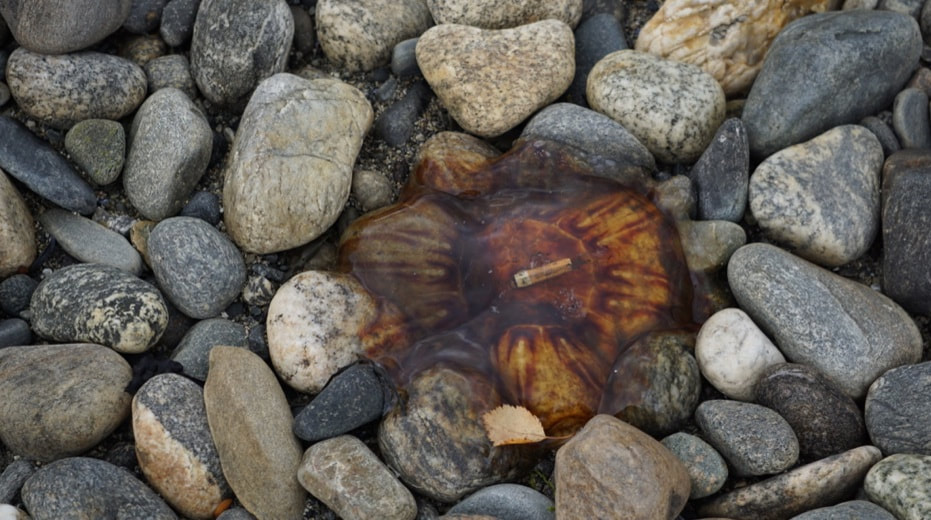 Photo by Karen Elizabeth Bishop. Photo by Karen Elizabeth Bishop. V. Bird Thoughts 1. We are the noise. We are looking through the noise. Birds correspond to thoughts. 2. The sun doesn’t leave the shadow. It’s the plants. They know their own mind. The mushroom flowers across the screen. 3. I pull a woman from the water. White like the moon and as distant. She tells me: your future is now. Our future is now. She breaks in two. 4. Sound travels like a nerve on the spine. I collect it here, you say, showing me your copper wires and tree branches. Can you hear it, can you hear anything? A clearing upon the hill. The lightning above the door. 5. Hands flat upon the table. A smokescreen and a skull. The noise comes in waves in light against the sky. Trees lit up like eyes upon the shore unblinking. We turn back toward the sensing dark. Karen Elizabeth Bishop Karen Elizabeth Bishop teaches literature for a living. She lives in Sevilla, Spain. Perhaps Not (1) I went to Ecology of Senses? Field_Notes What was that? Socratic dialogue – it's not what I want. Were they artists No I’m not an artist. Were they scientists I was trained as a scientist, but no I am not. Practitioners Praxisters Prax-schm-ishiners... I am not being contrary, but no I am not. Well who are they ... are we then? ... (2) What do we want. A process? But no-output expected…. Or wanted? Would you like to see my no-output? Is there a no-process and no-dynamic to go with it? How about a presentation? No it's not a presentation I don’t like that word. I think we are getting somewhere – perhaps maybe I don’t know perhaps not? (3) What can I say? What can I contribute? Second Order? Whose order? Disorder! Self-order-(an/ anodon)nized? We are a slime mould? But we are doing our own thing. We are rather loose. I think it is framed - I don’t like the term frame. From the centre in own directions - No not quite that. Can you help – no help - too much wisdom from you! Banned words pungent · droplets · in a landscape- no more facts In a post-fact, neo-truth fake news world – no clichés allowed (we all know what you mean) and that’s bounded, restricted not unbounded restructed Everyone goes to Berlin so I go to Seoul – a new … There is nothing new – no, maybe perhaps not Technical equipment It's not essential, Arduino, Android, PowerBank Breathe the earth, take your clothes off and rub yourself with something soily Artistic stereotypes (but we are not artists – no, maybe perhaps not How do I say, what I do not want to say, what I say AYE SAY! Marcus Petz Marcus Petz studies rural resilience at the Department of Philosophy and Sociology at Jyväskylä University, Finland. Embedded Second Order Light ripples Sanna and Malla embraced in warmth my arrival in an Arctic summer’s wain As a Humus sapiens, I would delve ʽn’ dive where rangifer and salvelinus dwell Peili fjord á pied-à- mer sand blackstones, bladderwrack and jellyfish pain Rain in the face so cold nice for a quick dip sauna etiquette- mixed? up face in soil smell life and electrics, smokey turvekota, Aurora, Feminist moment – Field Notes with children waves, ripples, currents moiré patterns in the hydrosphere-cum-atmosphere-soilsphere-me-as-well slime mould, talking so much talking big words and strange books, growing, divine, thinking silence again 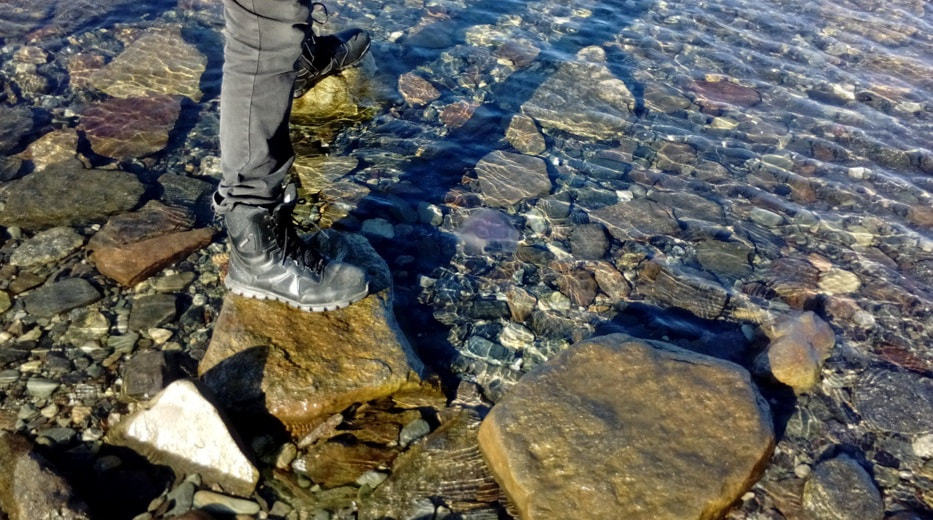 Fjord Pied-à- Mer, photography by Marcus Petz. Fjord Pied-à- Mer, photography by Marcus Petz. this plant with teeth: an exercise in reverse ekphrasis 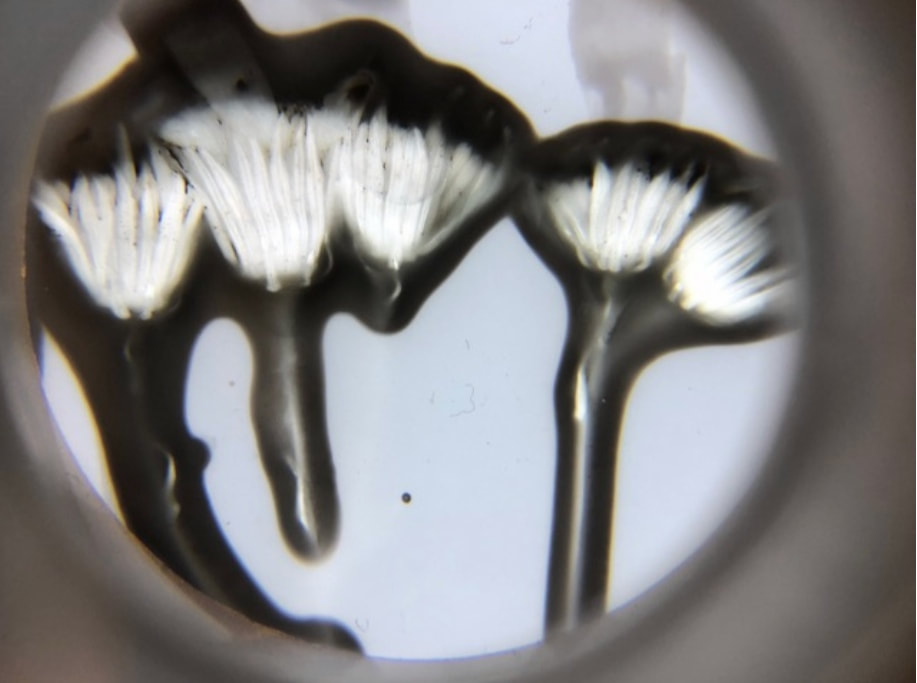 Photo, from Jawline, 2018, by Sam Nightingale. Photo, from Jawline, 2018, by Sam Nightingale. this plant with teeth this plant with teeth flowers overjawing mouth lips heaven- ward turned like two new deer in profile against the treebank suck young cheeks toward the sky tendons tight in advance of the leap petals back anther and filament raised in relief this morning i overflower this morning i over- flower this morning i leap antlers blooming. Karen Elizabeth Bishop Sam Nightingale is a visual artist based in the UK. He uses experimental modes of photographic image production and speculative fieldwork to make sensible the temporalities and spatialities of environments that we are a part of but that also persist beyond the limits of human experience. Patricio Hidalgo Morán es un artista multidisciplinario que reside y trabaja actualmente en Sevilla, España. Una gran parte de sus numerosos trabajos visuales, escénicos, y fílmicos se dedican al mundo del flamenco y la pintura viva, lo cual se puede ver representado en la página web: www.patriciopinceles.com. Ha colaborado también en varios libros infantiles, producciones audiovisuales que trabajan en el intersticio de la poesía y el arte visual, y dirige la revista Mordisco. Su arte ha sido galardonado y expuesto en galerías de arte y exhibiciones en España, Europa, las Américas y Rusia. Patricio Hidalgo Morán is a multidisciplinary artist who lives and works in Sevilla, Spain. A great number of his numerous visual, stage, and film productions focus on the world of flamenco and live painting, all of which can be accessed at the gallery housed on his website: www.patriciopinceles.com. He has also collaborated in the writing and drawing of various children’s books, audiovisual productions that work at the intersection of poetry and visual art, and he directs the magazine Mordisco. His art has been the recipient of numerous awards and exhibited in galleries and expositions in Spain, Europe, the Americas, and Russia. The Lost and Found Department There is no Lost and Found department at the Kilpisjärvi Biological Station. I went looking for a lost thermos. I heard someone yell, “I can’t find my other sock!” We all found ourselves searching for belongings in a place that doesn’t have a Lost and Found department. Here’s a guide to finding things around the Kilpisjärvi Biological Station:
Shruti Sunderraman Shruti Sunderraman is a writer and journalist based in Bangalore, India. She is a culture vulture and writes about music, art, gender and environmental science. She finds comfort in mushroom soup and blades of grass. Read her work here and here. In Thrall of Tininess Large things never wonder their purpose. They settle as landscape and await eternity. Their peace is traditional. Their self-assurance, alien. Tiny things wander. sometimes, into wonder most times, into trouble. Curiosity never killed their cat. they have exceptionally smart cats. A Nordic mountain is a lesson in royalty. Buckingham is a toilet on its landslide. A glacier in the distance laughs unbearably at humanness. Social cachets tested on ice are but punchlines to the immortal. a patch of lichen, meanwhile, awaits winter. It is coy. You never saw it spread across the riverside. This is the nature of patience. Standing on the precipice of largeness, my tiny heart heaves a Tundric sigh. We are terrified, we are relieved. Stepping away from desks lights and tall paper bills, we are joyous to be tiny again. The mountains dismiss me; not unkindly. Insignificance is beautiful. Shruti Sunderraman
2 Comments
12/1/2018 03:18:26 pm
Oh my goodness! These are so beautiful! What painstaking observation. I'm really enjoying all of these here with joy and reverence for your hard work. Thanks so much for this post. It is very inspiring and feels like journeying home after a long time being away with seemingly more important activities--but whatever they were slips away out of the grasp of my mind and heart.
Reply
Valerie Bacharach
12/2/2018 07:51:54 am
The photos and poems are wonderful. Thanks for sharing these.
Reply
Your comment will be posted after it is approved.
Leave a Reply. |
The Ekphrastic Review
COOKIES/PRIVACY
This site uses cookies to deliver your best navigation experience this time and next. Continuing here means you consent to cookies. Thank you. Join us on Facebook:
July 2024
|
